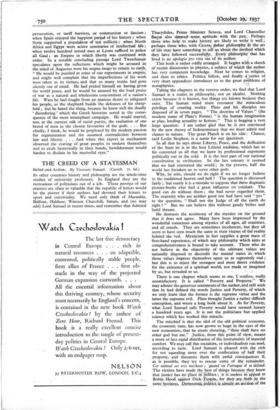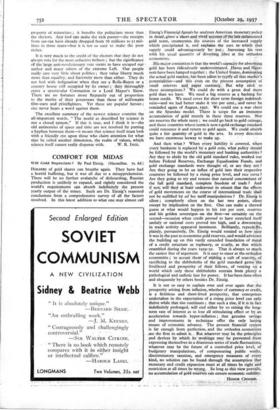THE CREED OF A STATESMAN
Belief and Action. By Viscount Samuel. (Cassell. 7s. 6d.)
IN other countries history and philosophy are the whole-time studies of university professors. In England they are the recreations of politicians out of a job. These parerga of our masters -are often-so-valuable that the republic of letters would be the poorer if their authors had devoted their leisure to sport and conviviality. We need only think of Macaulay, Balfour, Haldane, Winston Churchill, Smuts, and (we may add) Lord Samuel in recent times, and remember that Admiral Thucydides, Prime Minister Seneca, and Lord Chancellor Bacon also skew*. Katie_ aptitude;--with 'the _ pen.,.. Perhaps those who help to make history are likely to write- it well; perhaps those:who, with -qcera define philosaphyls the art of life may haVe something to tell us "abatit the MethOd which they have followed successfully,. ,,EyerY philosophy' that has lived is an apologia pro vita siut of its author.
This book is rather oddly arranged. It begins with a sketch of recent discoveries in physics, a subject of _which the author has very competent knowledge. Next he comes to religion, and then to ethics. Politics follow, and finally a Iseries of very short appendices introduces us to the great '"•
prt$blems of
metaphysics. .
Taking the chapters in the reverse order, we find that Lord Samuel is a realist in philosophy, not an .idealist. Nothing exists because it is known, but things are known because they exist. The human mind intik renounce the miraculous privilege of creating reality. Plato and his disciples are disposed of in seven pages. " The doctrine of Values " (the modern name of Plato's Forms) " is the human imagination at play, lending actuality to fictions." This is.begging a very large question. I am rather glad that he is not convinced by the new theory of Indeterminacy that we must admit real chance in nature. The great Planck is on his side:‘ Chance,
• said Stephen, is a name TOr out ignorance.
In all that he says about Liberty, Peace, and the deification
of the State he is in the best Liberal tradition, which has so far converted us all that we leave its professional exponents politically out in the cold. It is the best part of -mit national contribution to civilisation. In the last century -it seemed that we had converted the world ; in the present, half the
world has forsaken us to- serve other gods. • Why, he asks, should we do right if we no longer believe in the traditional heaven and hell ? The question is discussed fairly ; buf surely it is a mistake to suppose that-these dogmatic picture-books ever had great 'influence on 'coliduit. The good can do without them ; the bad never regarded them. The majority who are neither good nor bad have *Said " yes " to the question; " Shall not the Judge of all the earth do right ? " But we can believe this without gaudy bribes and lurid threats.
He distrusts the testimony of the mystics on the ground that it does not agree. Many have been impressed 'by the wonderful consensus among mystics of all ages, all countries, and all creeds. They are sometimes incoherent, but they all seem to have seen much the same in their visions of th4 reality behind the veil. Mysticism in fact supplies a great mass of • first-hand experience,- of which any philosophy which aims at
comprehensiveness is bound to- take account. Those who do not believe in the objectivity of the ultimate values are naturally disposed to discredit the mental states in which those values impress themselves upon us as supremely real ; but this is to reject the strongest and most direct evidence for the existence of a spiritual world, not 'made or imagined
by us, but revealed to us. .
There is one chapter which seems to me, I confess, really
unsatisfactory. It is called " Poverty and PrOperty." We may admire the generous sentiments of the author, and still wish that he had defined the words Justice and PaVerty, Of which we only learn that the former is the supreme virtue and the latter the supreme evil. Plato thought Justice a-rather difficult conception, and wrote a long boOk about-- it. As for' Poverty, what Lord Samuel calls Poverty would have seemed luxury a hundred years ago.. It is not the politicians hut. 'applied science which has worked this miracle.
The mischief is that the idol of the old political economy,
the economic man, has now grown so huge in the eyes of the new economists, that he struts shouting, "thou shalt have no other god-but me." Justice; from this point. of vie*, means a more or less eqtial cliitribution of the instruments of material comfort. We may call this socialism, or individualism run mad, according to taste. Liird Samuel is pleased with the rich for not squealing more over the confiscation of half their property, and threatens them with awful consequences if, as is possible, they try to rescue some of the remainder. Cet animal est tres michant"; quand on Pattagai it se defend. The victims have made the best of things because they know that justice has no place iti politics ;' useless16-413eal to Robin Rood. against Dicks.Turpin; for .they _ars, 1:icifh in the
same auctiQU.of the
property of minorities ; it benefits the politicians more than the electors. Any fool can make the rich poorer-;-the receipts from sur-tax have already dropped from 76 millions to 51 mil- lions in three years—but it is not so easy to make the poor richer.
It is very much to the credit of the electors that they do not always vote for the most seductive bribers ; but the significance of the large anti-revolutionary vote seems to have escaped our,. author and many others of the extreme Left. Our people really care very little about politics ; they value liberty much more than equality, and fraternity more than either. They do not boil with indignation' when they see a Rolls-Royce or country house still occupied by - its owner ; they -thoroughly. enjoy a spectacular Coronation or a Lord Mayor's Show. `there are no fortunes more flagrantly out of proportion to the merits of their possessors than those of millionaire film-stars and ptizefighters. Yet these are populai heroes ; one never hears a word against them.
The excellent summary of the newest science contains the all-important words, " The world as described by science is not a closed system." If this is true, and I think it is—the old antinomies of space and time are not resolved by putting sr-hyphen between them—it means that science itself must look with a friendly eye upon- those who claim attention for what may be called another dimension, the realm of values, which science itself cannot really dispense with. , W. R. INGE.



























































 Previous page
Previous page